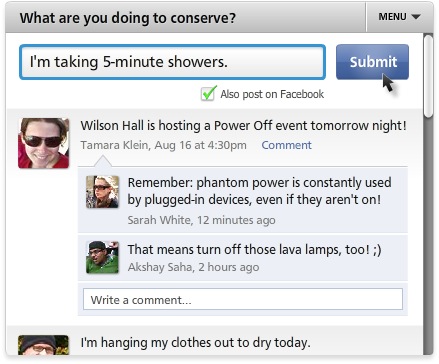Blog Post
Saving Energy and Water: Now, a College Sport
By leveraging social media, a national campus competition helps students turn small commitments into large-scale change.

Back when I was in college, I learned lots of fascinating but impractical things. The difference between phrenology and phenomenology. The anatomy of a flatworm. Three compelling examples of why Victor Frankenstein was the true monster in the novel named after him.
I couldn't have told you what a plug load was, though, let alone why it was important.
Campus Conservation Nationals
I probably wasn't alone in that. But thanks to the Campus Conservation Nationals, many more of today's college students will know a lot about plug loads and why they are important. This large-scale national contest attempts to motivate students to save energy and water by making it into an intercollegiate sporting event, with Facebook as the playing field.
As Pat Lane, USGBC Students lead at the Center for Green Schools, puts it in a recent blog post:
Dorms will be pitted against dorms, schools against schools and conferences against conferences in a combined effort to reduce energy consumption amongst college residential buildings across the country. Students will mobilize door-to-door and through social media, encouraging peers to make commitments for three weeks that will put their school at the forefront of the sustainability conversation.
There's also an ambitious overall energy goal to save a full gigawatt-hour during the eleven-week contest period.
From individual to collective action
The thing that's really cool about this competition is that it focuses on small individual commitments--simple things like taking five-minute showers--and yet finds a way to represent these tiny individual actions as a massive collective action.
SUPPORT INDEPENDENT SUSTAINABILITY REPORTING
BuildingGreen relies on our premium members, not on advertisers. Help make our work possible.
See membership options »By combining a sophisticated energy dashboard with social media, the competition aims to both challenge and inspire students to make a difference in their own dorms and classrooms.
Colleges and universities need to sign up by November 1, and the actual competition will take place from February 6 through April 23, 2012.
Why focus on individuals?
BuildingGreen has been around for 20 years now, and for most of that time, the focus of the green building community has been primarily on design and construction: how can we design, build, and retrofit our buildings and communities so they perform better?
The humans who live and work in our buildings have been a lesser--some might say nonexistent--focus. But in the past five years or so, the green building community has started to wake up to a very important fact: no matter how well we design a building or plan a retrofit, the occupants hold the keys to environmental performance.
"Occupant engagement"
As the buildings themselves have become more efficient, the building occupants' role in achieving sustainability goals has increased. Occupant engagement--the art of combining social science and building science to motivate individuals to save energy and water, reduce waste, and contribute to indoor environmental quality--has started to emerge as an ever-more-important field of research and action.
This is such an important emerging topic that our November Environmental Building News feature article on occupant engagement will be free to everyone, whether you're a BuildingGreen member or not.
Occupying our buildings more mindfully
While I, like many people, often despair at the vast discrepancy between my small individual actions and the need for mass collective action, projects like the Campus Conservation Nationals not only inspire me but also show me the immense power of individual action--once I can visualize it as part of a larger effort.
Not all of us can leave our jobs, classrooms, or homes to occupy Wall Street full time, but we can all do a better job of occupying our built environment. Whether you're a college student or not, what commitments--small or large--make you feel like you're doing your part? How do you visualize and evaluate your success, and what motivates you to do more?
Published October 25, 2011 Permalink Citation
(2011, October 25). Saving Energy and Water: Now, a College Sport. Retrieved from https://www.buildinggreen.com/blog/saving-energy-and-water-now-college-sport



Add new comment
To post a comment, you need to register for a BuildingGreen Basic membership (free) or login to your existing profile.